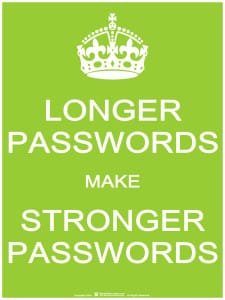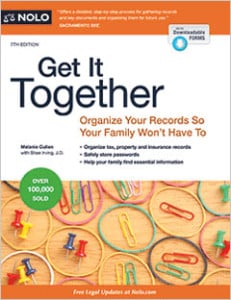Be prepared for the end:
Are you caregiving for a family member? Do you know their passwords? Heck, do you know all your own passwords? A recent article from the Huffington Post—I’m Still Paying For My Dead Husband’s Cell Phone Because I Don’t Know His Childhood Friend’s Name— Ann Brenoff points out the importance of knowing a loved one’s passwords. Luckily, armed with the death certificate, she got through most of her issues with her husband’s accounts, but alas, there was one that haunted her because she didn’t know her husband’s password. I encourage you to read the article.

and Keep Track of Them
This article also reminds us that, along with knowing a loved one’s passwords, we also need to know about all their accounts. This can be more difficult when you are not intimately involved in a loved one’s daily caregiving. You shouldn’t assume a second parent knows where everything is. Parent #1 may be handling everything without involvement from Parent #2.
It’s fair to say that getting into someone’s financial affairs can get sticky. In this day and age, when so many people take advantage of the elderly (even family members), it’s understandable if your loved one is uncomfortable with sharing the information. At the very least, make sure they have a file with all the needed information, INCLUDING passwords, should you need to suddenly step in to take care of their affairs. This also applies to any loved one who may not have someone intimately involved in their daily life (i.e. unmarried, childless sibling/aunt/uncle/etc.)
What we need to know:
Start with Assets and Liabilities. If your loved one’s affairs are complicated, chances are they already have an attorney and/or an accountant handling their finances. Know if this is true and who to contact, and which member of the family has been designated as having the power of attorney. Otherwise…
Assets generally would be their sources of income and other assets they own, such as:
- Bank accounts: checking, savings, retirement,
- Stocks/Bonds/Annuities
- Property
- Health Savings Accounts
- Pension
- Life Insurance Policy(s)
Liabilities would generally include:
- Mortgage
- Credit Cards
- Utilities: Gas, Electric, Cable, Phone, (Keep in mind that if you need to keep utilities going and they are paid automatically, either transfer the form of payment, or wait to close the associated account.)
- Auto Loan
- Other debts: Most Importantly, items automatically billed to their credit card
Ideas for gathering the information:

My father taught me a great trick years ago for keeping track of my passwords. (NO, you shouldn’t use the same password for every account.) Write them down in an address book, alphabetized by the name of the account. It’s especially helpful with a family, who also sets passwords. It is a real sanity saver.
Thankfully my father has one too. (I think I learned it from him.) So I feel pretty confident we can get into his accounts. But I’m not sure I know about all of his accounts. For example, there may be some he hasn’t needed to access online, and therefore hasn’t set up a username and password. So how do I know what he has?
Well, the other day, I sat down and helped him with his taxes. I realized it was a great way to learn what accounts provided income for him and my mother; and I didn’t have to pry. Though there are many accounts we need to know about, keep in mind that tax returns are a great place to start.
Better yet, here’s a great book– Get It Together – Organize Your Records So Your Family Won’t Have To, by Melanie Cullen with Shae Irving, J.D.– to help with the process. It’s light years more thorough than the list I’ve made above. I’ve ordered my own copy and will be sharing it with my family to force us all to get our records in order—me included. I hope you will do the same.

